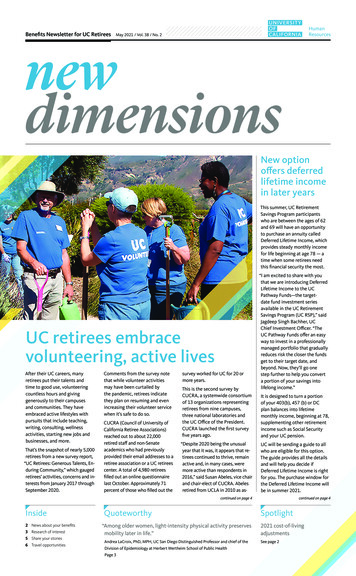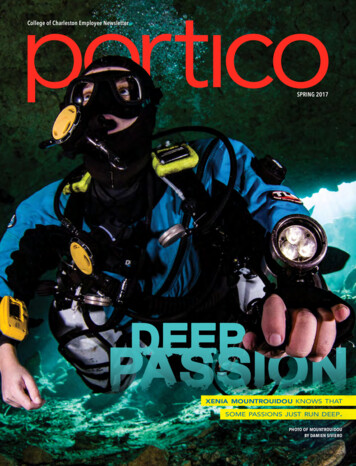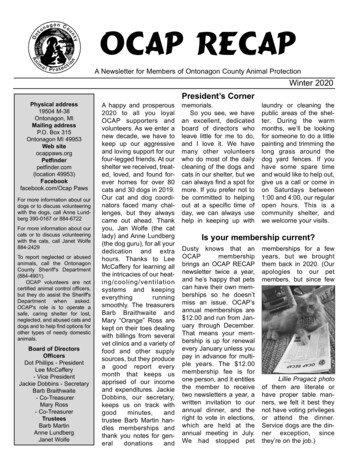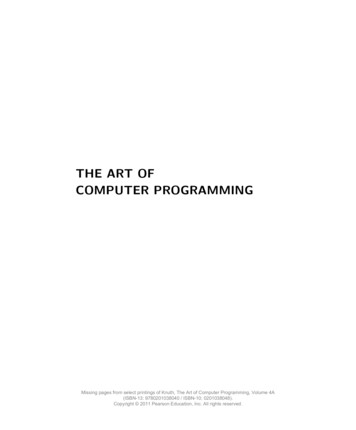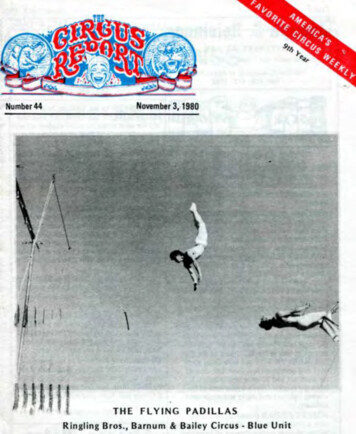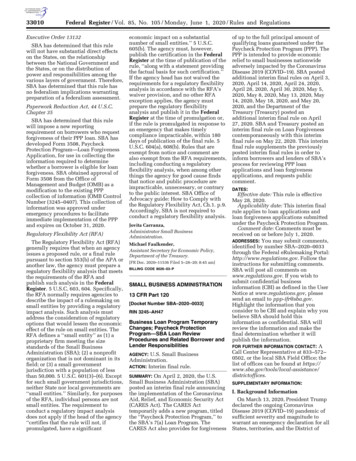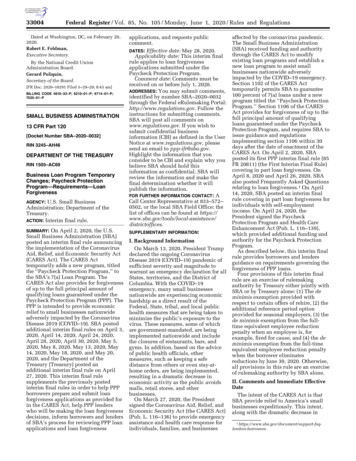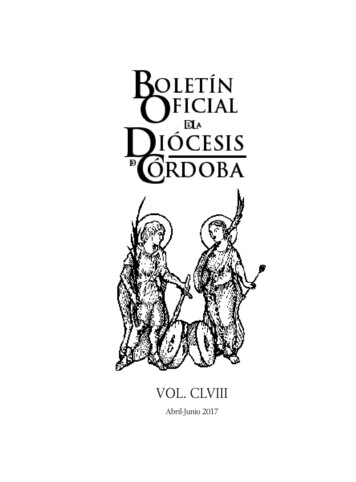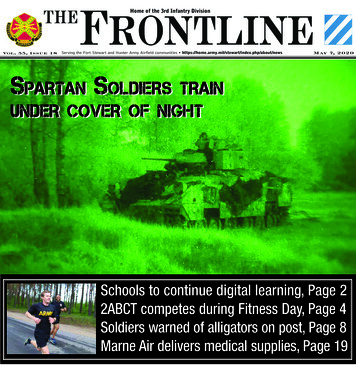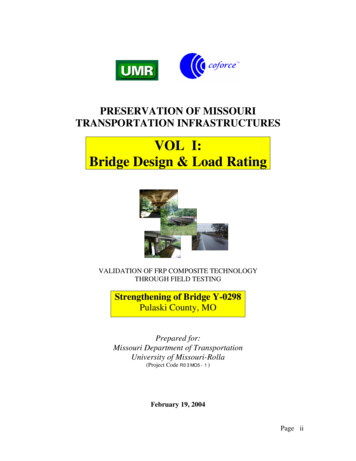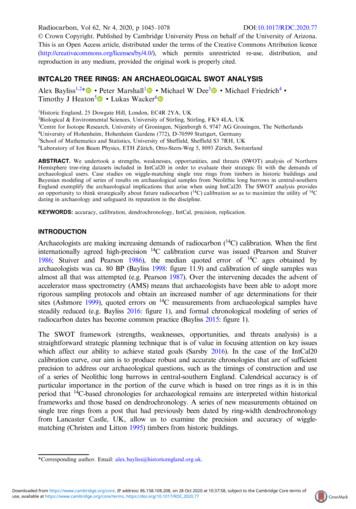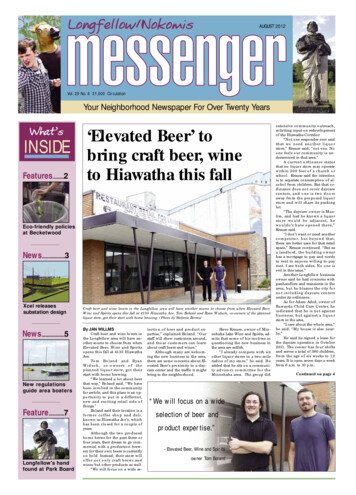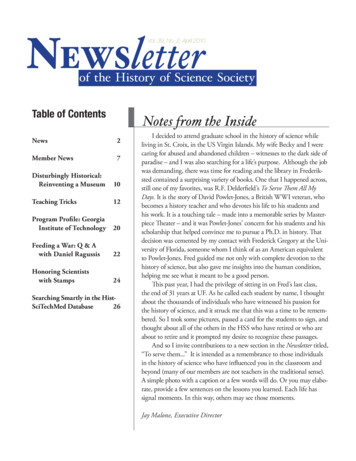
Transcription
NewsletterVol. 39, No. 2, April 2010of the History of Science SocietyTable of ContentsNotes from the InsideNews 2Member News 7Disturbingly Historical: Reinventing a Museum 10Teaching Tricks 12Program Profile: Georgia Institute of Technology 20Feeding a War: Q & Awith Daniel Ragussis 22Honoring Scientists with Stamps 24Searching Smartly in the HistSciTechMed Database 26I decided to attend graduate school in the history of science whileliving in St. Croix, in the US Virgin Islands. My wife Becky and I werecaring for abused and abandoned children – witnesses to the dark side ofparadise – and I was also searching for a life’s purpose. Although the jobwas demanding, there was time for reading and the library in Frederiksted contained a surprising variety of books. One that I happened across,still one of my favorites, was R.F. Delderfield’s To Serve Them All MyDays. It is the story of David Powlet-Jones, a British WWI veteran, whobecomes a history teacher and who devotes his life to his students andhis work. It is a touching tale – made into a memorable series by Masterpiece Theater – and it was Powlet-Jones’ concern for his students and hisscholarship that helped convince me to pursue a Ph.D. in history. Thatdecision was cemented by my contact with Frederick Gregory at the University of Florida, someone whom I think of as an American equivalentto Powlet-Jones. Fred guided me not only with complete devotion to thehistory of science, but also gave me insights into the human condition,helping me see what it meant to be a good person.This past year, I had the privilege of sitting in on Fred’s last class,the end of 31 years at UF. As he called each student by name, I thoughtabout the thousands of individuals who have witnessed his passion forthe history of science, and it struck me that this was a time to be remembered. So I took some pictures, passed a card for the students to sign, andthought about all of the others in the HSS who have retired or who areabout to retire and it prompted my desire to recognize these passages.And so I invite contributions to a new section in the Newsletter titled,“To serve them.” It is intended as a remembrance to those individualsin the history of science who have influenced you in the classroom andbeyond (many of our members are not teachers in the traditional sense).A simple photo with a caption or a few words will do. Or you may elaborate, provide a few sentences on the lessons you learned. Each life hassignal moments. In this way, others may see those moments.Jay Malone, Executive Director
History of Science Society NewsletterNews and InquiriesUniversity of Chicago Press JoinsCurrent Scholarship ProgramThe University of Chicago Press and JSTOR announced that they will join forces in the CurrentScholarship Program. Scheduled to launch early2011, the program will bring scholarly content fromleading not-for-profit publishers to a single integratedplatform, making its use more innovative, efficient,and affordable for faculty, students, librarians andpublishers.The University of Chicago Press, one of theworld’s oldest and largest university presses, brings51 titles to the program, including many of the mostinfluential publications in the world. Both currentand back issues will be accessible on the platform.There are now 11 publishers working togetheras part of the program, and that number is rapidlyincreasing. With the addition of Chicago, the currentissues for at least 150 journals will be available onJSTOR by 2011. This content will be accessible alongside the more than 1,100 journals with back issueson JSTOR today as well as a growing set of primarysource materials from libraries and museums.More than 6,000 JSTOR library participants worldwide will be able to license the current journals,either individually or as part of current issue collections, together with JSTOR back issue collections ina single transaction. The journals will also continueto be preserved in Portico, the digital preservationservice that, along with JSTOR, is part of the notfor-profit ITHAKA. For more information about theCurrent Scholarship Program, urrentScholarship.jsp.Marjorie Howard Futcher DigitalPhoto Collection LaunchedThe Osler Library of the History of Medicine andthe McGill University Library are launching theonline Marjorie Howard Futcher Photo Collection athttp://digital.library.mcgill.ca/futcher. This is a seriesof close to 1,000 images arranged in two albums dating from 1890 to 1910 by Marjorie Howard Futcher(1882-1969), daughter of the former Dean of theFaculty of Medicine and Osler’s mentor R. PalmerHoward. The site contains a number of photographsof medical people, including Sir William OslerHistory of Science SocietyExecutive OfficePostal AddressPO Box 117360University of FloridaGainesville, FL 32611-7360Physical Address3310 Turlington HallUniversity of FloridaGainesville, FL 32611Phone: 352-392-1677/Fax: 352-392-2795E-mail: info@hssonline.orgWeb site: http://www.hssonline.org/Subscription InquiriesUniversity of Chicago PressPhone: 877-705-1878; Fax 877-705-1879E-mail: subscriptions@press.uchicago.eduOr write University of Chicago Press, Subscription FulfillmentManager, PO Box 37005, Chicago, IL 60637-7363Moving?Please notify both the HSS Executive Office and the University of Chicago Press. History of Science Society Newsletter April 2010Editorial Policies, Advertising and SubmissionsThe History of Science Society Newsletter is published in January, April, July, and October,and sent to all individual members of the Society.The Newsletter is edited and published in the Executive Office. The format and editorial policies are determined by the Executive Director in consultation with the Committee onPublications and the Society Editor. All advertising copy must be submitted in electronic form.Advertisements are accepted on a space-available basis only, and the Society reserves theright not to print a submission. The rates are as follows: Full page (7 x 9.25”), 625; Horizontalor Vertical Half page (7 x 4.6”), 375; Quarter page (3.5 x 4.6”), 225. The deadline for insertion orders is six weeks prior to the month of publication and should be sent to the attention ofthe HSS Executive Office. The deadline for news, announcements, and job/fellowship/ prizelistings is firm: Six weeks prior to the month of publication. Long items (feature stories) shouldbe submitted eight weeks prior to the month of publication. Please send all material to theattention of the executive office: info@hssonline.org. 2010 by the History of Science Society
History of Science Society Newsletter(1849-1919), Dean of McGill Medicine FrancisShepherd (1851-1929), and even Dr. John McCrae(1872-1918), later famous for his poem “In FlandersFields.” It also illustrates the social life of a young,well-connected Montreal woman during the period.The site provides an insight into the intersection ofthe worlds of elite medicine and wealth. Viewers canvirtually flip through the photo albums, replicatingthe experience of examining the originals and alsoseeing each picture in its larger context. For more information, please contact the Osler Library at osler.library@mcgill.ca or 514-398-4475, ext 09873.Announcing HOPOS: The Journal ofthe International Society for the History of Philosophy of ScienceAt long last HOPOS has its own journal. Publishedby the University of Chicago Press, the first issue isscheduled to appear Spring 2011 in both print andelectronic formats. The editors invite submission ofarticle-length manuscripts to be published in HOPOS: The Journal of the International Society for theHistory of Philosophy of Science. We seek to publishthe highest-quality scholarship on the history ofphilosophical discussions about science. The history of philosophy of science is broadly construed toinclude topics in the history of related disciplines,in all time periods and all geographical areas, usingdiverse methodologies. The journal aims to providean outlet for interdisciplinary work, increase thealready unusually high level of participation of international scholars in the history of the philosophyof science, raise the level of work in the history ofphilosophy of science by publishing scholarship thathelps to explain the links among philosophy, science,and mathematics, along with the social, economic,and political context, which is indispensable for agenuine understanding of the history of philosophy.HOPOS scholarship is firmly concerned with situating philosophical understandings of science withinthe broader historical and philosophical settings inwhich they were developed, and against the backdrop of mainstream issues in philosophical thought,covering epistemological, methodological, meta-physical, and moral issues relevant to the growth ofour knowledge of the world and human nature. Thejournal does not limit submissions to HOPOS members. Scholars from all related disciplines are encouraged to submit to the journal. The length of articlesis flexible, and all articles published in HOPOS arepeer reviewed. Please see the HOPOS journal homepage at http://www.journals.uchicago.edu/toc/hopos/for further information and for author instructions.The Madame Heymann Optical Collection – rediscovered after 85 yearsIn the early 20th century Madame Alfred Heymannassembled the world’s greatest collection of eyeglassesand eyeglass cases, which disappeared right after shedied in 1925. It has now been rediscovered and isnow available digitally at http://www.antiquespectacles.com.Post-event report: InternationalWorkshop on LysenkoismPortions of the International Workshop on Lysenkoism, held 4-5 December 2009 at the CUNYGraduate Center and Columbia University, wererecorded by CUNY TV and are available online. Toview, visit p.com/Welcome/published and clickon “Lysenko Workshop Live.” For further information on upcoming activities of the Working Groupon Lysenkoism contact William deJong-Lambert atwilliam.dejong-lambert@bcc.cuny.edu or WRL4@columbia.edu.New Masters Program in Science,Technology and International Development: University of EdinburghThe Science, Technology and Innovation Studies subject group of the University of Edinburghannounces a new Masters Programs in Science,Technology and International Development. ThisMSc program draws on the University ofEdinburgh’s long-standing reputation for excellence in medicine, science and engineering.History of Science Society Newsletter April 2010
History of Science Society NewsletterBased in Edinburgh, Scotland’s vibrant capitaland a UNESCO World Heritage city, the University is a home for science and technology studies,innovation studies and is a global hub of expertisein international development. As a student in ourprogram you will have the opportunity to drawtogether options from one of the UK’s largestgroupings of high quality social science, takingadvantage of all the resources one of the world’stop universities has to offer. Here you will be ableto build a degree that suits your regional, disciplinary and professional interests. This mastersprogram is open to students and professionalslooking to develop a deeper understanding of thecomplex dynamics of international developmentand how they play out in a global context. Forfurther information: http://www.sps.ed.ac.uk/gradschool/research masters programmes/msc rscience and technology.New contact information for Technology and CultureTechnology and Culture has moved to its new homeat the University of Oklahoma. Contact information for all new business, including submissions andcorrespondence is: techculture@ou.edu; Ph: 1-405325-2311. Address: Suzanne Moon, incoming Editor-in-Chief, The Technology and Culture EditorialOffices, University of Oklahoma, Cate Center 4, 332Cate Center Dr., Room 484, Norman, OK 73019,USA.Johannes Kepler Working GroupThis new C41/ICHA Working Group was created inOctober 2009 and will exist during the current triennium only. The Group was created because Keplerstudies have reached a critical point with the demisein 2008 of the Kepler Kommission, which oversawthe publication of Kepler’s Collected Works (Gesammelte Werke). There are serious issues that threatenthe long-term availability of that fundamental work;for example, several of the 21 volumes (includingnearly all the vitally important correspondence) arenow out of print, and – even more seriously – the History of Science Society Newsletter April 2010corpus of primary and secondary material that formerly comprised the Kommission needs to be givena permanent home that will ensure that this priceless documentation and library will continue to bemade easily available to Kepler scholars in both theiroriginal format and electronically (the photostatedmanuscripts and library are currently housed in theBavarian Academy of Sciences). These issues needto be tackled on a high-visibility platform, and thisWG, first proposed during Special Session 9 (Marking the 400th Anniversary of Kepler’s Astronomianova) of the XXVII IAU GA in Rio de Janeiro, hasbeen set up as the platform for such activities. Themembers of the Johannes Kepler Working Groupare: T. J. Mahoney (Spain) [Chair]; A. E. L. Davis (UK); S. Dupré (Belgium); J. V. Field (U.K.);E. Hoeg (Denmark,); G. Hon (Israel); A. Mosley(U.K.); J. M. Pasachoff (U.S); J.-C. Pecker (France);S. J. Rabin (U.S); B. Stephenson (U.S); J. Wlodarczyk (Poland); and G. Wolfschmidt (Germany). Forfurther information: http://www.le.ac.uk/has/icha/wg jk.shtml.Bakken Museum Honored withLeading Edge Award From Association of Science-Technology CentersThe Association of Science-Technology Centers(ASTC) awarded The Bakken the 2009 Roy L. Shafer Leading Edge Award for Visitor Experience for itsScience Assets-based School Partnership program on31 October 2009 in Fort Worth, Texas. The ‘Edgie’recognizes extraordinary accomplishments that notonly enhance the performance of the institution,but also significantly advance the mission of science-technology centers and museums. The Bakken’sMuseum’s mission is to inspire a passion for science.Because science and technology are rapidly changing the world in which today’s students live andwork, The Bakken developed the groundbreakingScience Assets-based School Partnership program incollaboration with the Minneapolis Public Schoolsto change how students think about and approachscience. The program successfully builds uponchildren’s creativity to help them develop confidence,
History of Science Society Newsletterreceive support and understand that science is ameaningful part of their daily life. A team of Bakken educators visits the classroom, actively involvingstudents in creative thinking and problem solving.As part of the program, children are introduced to‘People of Science’ who help bring science to life inthe classroom – such as a food scientist from General Mills whose job includes tasting cookies, andan engineer from Medtronic who uses Silly Puttyto demonstrate his work with polymers. The SchoolPartnership program also includes a professionaldevelopment component. Participating teachersreport increased confidence in teaching science. Positive outcomes have led to expansion of the programwhich will serve 2,700 district fourth graders andtheir teachers through 2011.Ph.D. Dissertations in the History ofScienceThe most recent list of dissertations pertaining to thehistory of science can be viewed at: sources/dissertations/index html.Complete Set of the Journal of theHistory of Biology WantedDonald J. McGraw is seeking a complete (or nearlycomplete) set of the Journal of the History of Biology.Please contact him through his business website html.Samir Okasha Wins Lakatos AwardThe London School of Economics and PoliticalScience announces that this year’s Lakatos Award,of 10,000 for an outstanding contribution to thephilosophy of science, goes to: Samir Okasha (BristolUniversity), for his book Evolution and the Levels ofSelection (Oxford University Press, 2006). He willvisit LSE to receive the Award and give the AwardPublic Lecture during summer term, 2010.2010 SAHMS MeetingThe 12th annual meeting of the Southern Association for the History of Medicine and Sciencewas held in Louisville, KY 5-6 March 2010 in theConference Center of Jewish Hospital. SAHMShosted over 70 lectures during this two day celebration of the history of medicine and science. The finalprogram and registration materials can be viewed at:http://www.sahms.net/HTML/2010.htm.InterUnion Commission of Astronomy NewsletterThe Inter-Union Commission for the History of Astronomy (DHST together with IUA) has re-launchedits newsletter. You can find it at http://www.le.ac.uk/has/icha/documents/icha news 09.pdf, and viahttp://www.dhstweb.org.IHPST NewsletterThe latest newsletter of the IHPST group is nowavailable on the Web at: s for Scholars: Institutefor Advanced Study, School of Historical StudiesThe Institute is an independent private institutionfounded in 1930 to create a community of scholarsfocused on intellectual inquiry, free from teaching and other university obligations. Scholars fromaround the world come to the Institute to pursuetheir own research. Candidates of any nationalitymay apply for a single term or a full academic year.Scholars may apply for a stipend, but those withsabbatical funding, other grants, retirement fundingor other means are also invited to apply for a nonstipendiary membership. Some short-term visitorships (for less than a full term, and without stipend)are also available on an ad-hoc basis. Open to allfields of historical research, the School of HistoricalStudies’ principal interests are the history of western,near eastern and Asian civilizations, with particular emphasis upon Greek and Roman civilization,the history of Europe (medieval, early modern, andmodern), the Islamic world, East Asian studies, thehistory of art, the history of science, philosophy,modern international relations, and music studies.History of Science Society Newsletter April 2010
History of Science Society NewsletterResidence in Princeton during term time is required.The only other obligation of Members is to pursuetheir own research. The Ph.D. (or equivalent) andsubstantial publications are required. Informationand application forms may be found on the School’sWeb site, www.hs.ias.edu or contact the School ofHistorical Studies, Institute for Advanced Study,Einstein Dr., Princeton, N.J. 08540 or at mzelazny@ias.edu. Deadline: 1 November 2010.Cuban Society for the History of Science and Technology BoletinBoletin No. 31 of the Cuban Society for the Historyof Science and Technology is now available as a pdf.Contact Jose Altshuler at jea@infomed.sld.cu formore information.CFP: The Brock Review, “Animals inHuman Societies”The Brock Review is seeking scholarly essays andcreative pieces for an upcoming issue on the themeof “Animals in Human Societies.” This issue willfocus on changing ideas about the use and treatmentof animals in contemporary societies and the ethical,economic and political significance of animal rights.This issue will be co-edited by Dr. John Sorenson(Department of Sociology, Brock University). Possible topics might include: Animal/human bondsand mutual aid; Representations of animals; Animal rights and social justice; Veganism, abolitionism and the rise of “happy meat”; Normalization ofspeciesism; Animal rights and anarchism. The BrockReview is a peer-reviewed, interdisciplinary journalpublished by the Humanities Research Institute atBrock University. Scholarly essays submitted to TheBrock Review should not exceed 25 double-spacedpages in length. Essays should adhere to the latestedition of the Chicago Manual of Style and includeendnotes (where necessary) and a biblio
Shepherd (1851-1929), and even Dr. John McCrae (1872-1918), later famous for his poem “In Flanders Fields.” It also illustrates the social life of a young, well-connected Montreal woman during the period. The site provides an insight into the intersectio
